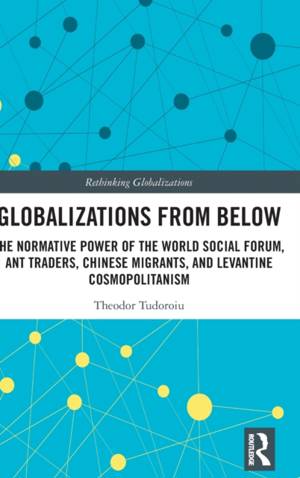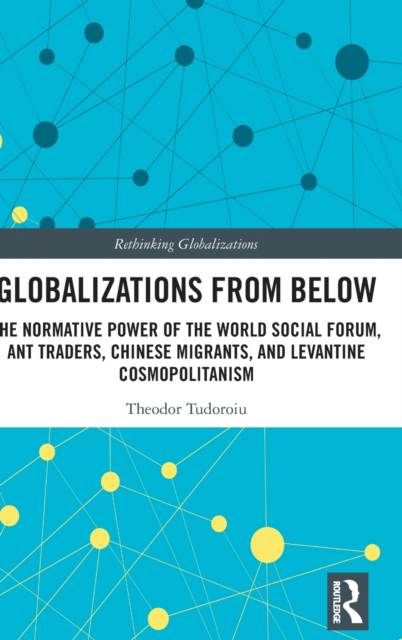
- Retrait gratuit dans votre magasin Club
- 7.000.000 titres dans notre catalogue
- Payer en toute sécurité
- Toujours un magasin près de chez vous
- Retrait gratuit dans votre magasin Club
- 7.000.0000 titres dans notre catalogue
- Payer en toute sécurité
- Toujours un magasin près de chez vous
Globalizations from Below
The Normative Power of the World Social Forum, Ant Traders, Chinese Migrants, and Levantine Cosmopolitanism
Theodor TudoroiuDescription
Globalizations from Below uses a Constructivist International Relations approach that emphasizes the centrality of normative power to analyze and compare the four globalizations 'from below.'
These are: (1) the counter-hegemonic globalization represented by the 'movement of movements' of alter-globalization transnational social activists, who try to put an end to the Neoliberal nature of the Western-centered globalization 'from above'; (2) the non-hegemonic globalization enacted by 'ant traders' that are part of the transnational informal economy; (3) the partially similar Chinese-centered globalization, whose entrepreneurial migrants are strongly influenced and instrumentalized by the Chinese state; and (4) the first wave globalization 'from below' that paralleled (and outlived) the 1870-1914 globalization 'from above.' This book identifies their common features and uses them to define the concept of globalization 'from below' as a set of socio-economic or socio-political processes that involve large transnational flows of people, goods, and/or ideas characterized at least in part by informality. They are enacted by entrepreneurial or activistic individuals who either take advantage of the normative power of the hegemon at the origin of an international order and an associated globalization 'from above, ' or - explicitly or implicitly - transgress, contest, and try to redefine dominant economic, legal, political, and socio-cultural norms, thus challenging the existing international order and globalization 'from above.' By constructing a unified theoretical framework, this book attempts to open a new field of interdisciplinary research that should take globalizations 'from below' out of their current scholarly marginality.
This is one of the first scholarly works to collectively present more than one globalization 'from below, ' and will be of great interest to students, scholars, and researchers of International Relations, International Political Economy, Development Studies, Economic History, Anthropology, Diaspora Studies, and Chinese Studies.
Spécifications
Parties prenantes
- Auteur(s) :
- Editeur:
Contenu
- Nombre de pages :
- 364
- Langue:
- Anglais
- Collection :
Caractéristiques
- EAN:
- 9781032323718
- Date de parution :
- 09-09-22
- Format:
- Livre relié
- Format numérique:
- Genaaid
- Dimensions :
- 156 mm x 234 mm
- Poids :
- 707 g

Les avis
Nous publions uniquement les avis qui respectent les conditions requises. Consultez nos conditions pour les avis.






